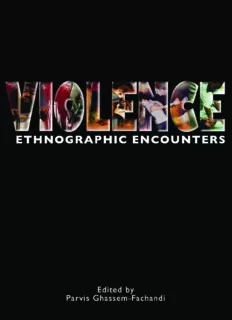Table Of ContentViolence:Mizoguchi 3/7/09 08:35 Page i
Violence
Violence:Mizoguchi 3/7/09 08:35 Page ii
Encounters:ExperienceandAnthropologicalKnowledge
ISSN:1746-8175
SeriesEditor:JohnBorneman
Encounters:ExperienceandAnthropologicalKnowledgeisaseriesthatexamines
fieldwork experiences of contemporary anthropologists. It aims to render into
vivid and accessible prose the insights gained from fieldwork on topics such as
money,violence,sexandfood.Theseshortcollectionsofessaysarecommittedto:
(cid:1) thesubjectivequalityofsensualexperience,tiedtoaparticulartimeandplace;
(cid:1) curiosityindifferenceitself,intranslatingthestrange,foreignorunassimilable;
(cid:1) storytelling that contributes both to the documentary function of the ethno-
graphicencounterandtoanalyticalpotential.
Previouslypublishedinthisseries:
Money:EthnographicEncounters
EditedbyStefanSendersandAllisonTruit
Violence:Mizoguchi 3/7/09 08:35 Page iii
Violence
Ethnographic Encounters
Edited by
Parvis Ghassem-Fachandi
Oxford•NewYork
Violence:Mizoguchi 3/7/09 08:35 Page iv
Englishedition
Firstpublishedin2009
Berg
Editorialoffices:
1stFloor,AngelCourt,81StClementsStreet,OxfordOX41AW,UK
175FifthAvenue,NewYork,NY10010,USA
©ParvisGhassem-Fachandi2009
Allrightsreserved.
Nopartofthispublicationmaybereproducedinanyform
orbyanymeanswithoutthewrittenpermissionofBerg.
BergistheimprintofOxfordInternationalPublishersLtd.
LibraryofCongressCataloging-in-PublicationData
Violence:ethnographicencounters/editedbyParvisGhassem-Fachandi.
p.cm.
Includesbibliographicalreferencesandindex.
ISBN978-1-84788-416-9(pbk.:alk.paper)—ISBN978-1-84788-417-6
(cloth:alk.paper) 1. Violence.2. Ethnology—Fieldwork.3. Political
violence.4. Ethnicconflict. I.Ghassem-Fachandi,Parvis.
GN495.2.V5552009
305.8—dc22 2009021840
BritishLibraryCataloguing-in-PublicationData
AcataloguerecordforthisbookisavailablefromtheBritishLibrary.
ISBN9781847884176 (Cloth)
9781847884169(Paper)
TypesetbyAvocetTypeset,Chilton,Aylesbury,Bucks
PrintedintheUnitedKingdombyMPGBiddlesLtd,King’sLynn
www.bergpublishers.com
Violence:Mizoguchi 3/7/09 08:35 Page v
Contents
NotesonContributors vii
Foreword x
Acknowledgements xii
Introduction 1
ParvisGhassem-Fachandi
1 WrittenonMyBody 15
BillieJeanIsbell
2 BandhinAhmedabad 35
ParvisGhassem-Fachandi
3 FieldworkandFearinIraqiKurdistan 51
DianeE.King
4 TheSenseofWarSongs 71
BilindaStraight
5 SleepingwithOneEyeOpen 79
KristenDrybread
6 AHellofaParty 97
BrendaMaiale
7 ArrivinginJewishBuenosAires 107
NatashaZaretsky
8 DreamworkandPunishmentinLebanon 119
JohnBorneman
9 UnwelcomedandUnwelcomingEncounters 135
AnnarosePandey
Violence:Mizoguchi 3/7/09 08:35 Page vi
vi • Contents
10 GuidetoFurtherReading 145
ParvisGhassem-Fachandi
Bibliography 157
Index 163
Violence:Mizoguchi 3/7/09 08:35 Page vii
Notes on Contributors
JohnBornemanteachesanthropologyatPrincetonUniversity.Hehasdonefield-
workinGermany, CentralEurope,Syria,andLebanon and haspublishedwidely
on issues of kinship, sexuality, nationality, justice and political form. His most
recent ethnographic study is Syrian Episodes: Sons, Fathers, and an Anthro-
pologistinAleppo(2007).
Kristen Drybread teaches anthropology at Columbia University, where she
recentlycompletedherPh.D.Inadditiontostudyingrelationshipsbetweenincar-
ceration, identity, masculinity and justice among male prisoners in a Brazilian
juvenile detention facility, she has conducted research on issues of immigration,
nationality, human rights, and childhood socialization. She has conducted ethno-
graphicresearchinIndonesia,Braziland,mostrecently,inNewYorkCity.Grants
from the Wenner-Gren, Fulbright Hays, Firestone, and Woodrow Wilson
FoundationsmadepossibleherfieldresearchinBrazil.
ParvisGhassem-FachanditeachesintheDepartmentofAnthropologyatRutgers
UniversityinNewJersey.BorninthedividedformerWestBerlin,hegrewupin
Germany, France, and Canada. He received his Ph.D. in anthropology from
Cornell University in 2006. He taught at Princeton in 2006 and held a post-
doctoral fellow at the Center for Religion and Media at NewYork University in
2006–7.Hehascompletedfieldresearchonnationalism,religionandviolencein
Gibraltar, the United States, and India. He has done research in Gujarat in 1995,
1999,2000,2001–3and2005.Heiscurrentlycompletingabookonthe2002anti-
MuslimpogrominGujarat,India.
BillieJeanIsbellisProfessorEmeritaandGraduateProfessorofAnthropologyat
Cornell University. She served in the Peace Corps in Colombia during 1963–5.
She attended San Francisco State and was awarded a Ph.D. in Anthropology in
1973 from the University of Illinois. Her expertise is in the Andean region of
South America. She was the director of the Andean program for Cornell
International Institute for Food, Agriculture and Development from 1990 until
2002.SheservedasdirectoroftheLatinAmericanProgramatCornellfrom1987
to 1993 and again in 2001–2. She has been a Fellow at the Woodrow Wilson
vii
Violence:Mizoguchi 3/7/09 08:35 Page viii
viii • NotesonContributors
Center,andChercheurAssociéedeL’ÉcoledesHautesÉtudes,Paris.Shereceived
grants and fellowships fromWoodrowWilson, Fulbright, MacArthur, NEH, and
A Ford Training Grant for Interdisciplinary Training of Graduate Students. The
most recent grants include an Institute for the Social Sciences grant (2006) and
two Faculty Innovation inTeaching grants from the office of the Provost (2005,
2007)andagrantfromOlinlibrarytocreateadigitalwebsite(2005)resultingin
the following sites: (1) A Virtual Tour through Time and Space: Lessons from
Vicos, Peru (http://instruct1.cit.cornell.edu/courses/vicosperu/vicos-site/, accessed
5December2008)and(2)agrantfromOlinDigitalCollectiontocreateasitefor
Isbell’swork(http://isbellandes.library.cornell.edu/,accessed5December2008).
Diane E. King teaches in the Department of Anthropology at the University of
Kentucky. She completed her Ph.D. atWashington State University in 2000. Her
main research site is the Kurdistan Region of Iraq and she has also worked in
SoutheastAsiaandamongKurdishcommunitiesintheUnitedStates.Hertopical
interestsincludekinship,gender,migrationandthestate.Previouslyshetaughtat
AmericanUniversityofBeirut(2000–6,exceptduringtworesearchleaves),wasa
research fellow in the Department of History at the University of Kentucky
(2001–2)andcarriedoutfellowshipssponsoredbytheWilliamandFloraHewlett
Foundation(atUCSD,Spring2004)andtheGeorgeA.andElizaGardnerHoward
Foundation(atWashingtonStateUniversity,2006–7).
BrendaMaialeteachesintheDepartmentofAnthropologyatHobartandWilliam
Smith Colleges. She completed her Ph.D. at Cornell University in 2008. In her
worksheexamineshowrecentchangesinfiestapracticesaretransforminggender
subjectivitiesinsouthernMexicoandusestheZapotecfiestaasalenstoexamine
thewaysinwhichlocalconfigurationsofgenderarticulatewiththeglobalmarket,
the national imagination, and the contentious body politic of the Oaxacan state.
Her research in Oaxaca City and the Isthmus ofTehuantepec was funded by the
National Science Foundation, the Mario Einaudi Center for International Studies
atCornellUniversity,andtheTinkerFoundation.
AnnarosePandeyteachesanthropology,philosophyandglobalstudiesatWestview
HighSchoolinPortland,Oregon.Shehasfoundthatworkinginalargepublichigh
schoolisakindoffieldworkinandofitself.Anna’sresearchfieldworktookplace
inSidiIfni,Moroccoduring2001–2throughaFulbrightGrant.Herdissertationis
on the politics of nostalgia in formerly Spanish colonial Morocco. She is com-
pletinghergraduatestudyatCornellUniversity.
Bilinda Straight (Ph.D., University of Michigan 1997) is the editor of Women on
the Verge of Home and author of Miracles and Extraordinary Experience in
Northern Kenya and numerous articles and book chapters on gender, sexuality,
Violence:Mizoguchi 3/7/09 08:35 Page ix
NotesonContributors • ix
religion, material culture, and interethnic violence in northern Kenya. She is the
recipientofaFulbrightandtwoNationalScienceFoundationgrants.Thelatterare
generously supporting her recent and current work on violence affecting
theSamburupastoralistswithwhomshehasconductedresearchsince1992.She
isanassociateprofessorinanthropologyatWesternMichiganUniversity.
NatashaZaretsky(Ph.D.,PrincetonUniversity2008),isaculturalanthropologist
who studies political violence, social change, and citizenship. Her recent work
examines the significance of memorial practices to social movements that devel-
oped in the wake of violence in Argentina and how Jewish Argentines engage
memoriesofviolenceinredefiningtheirrelationshiptotheirstateandoneanother
as they negotiate for belonging. Zaretsky’s current research focuses on the
emergingArgentinediasporainEuropeandtheUnitedStates,investigatingtrans-
formations toArgentine citizenship and sovereignty in response to political and
economic uncertainty. She currently holds a postdoctoral lectureship in the
PrincetonWritingProgram,wheresheteachesaseminaronpoliticalviolenceand
socialchange.HerresearchinArgentinawasfundedbyaFulbrightgrant(2001–2)
and research grants from Princeton University’s Program in Latin American
Studies,CouncilonRegionalStudies,andPrograminJudaicStudies.
Description:Violence takes many forms. From large-scale acts of terrorism to assaults on single individuals, violence is a defining force in shaping human experience and a central theme in anthropological study. Violence: Ethnographic Encounters presents a set of vivid first-hand accounts of fieldwork experienc

